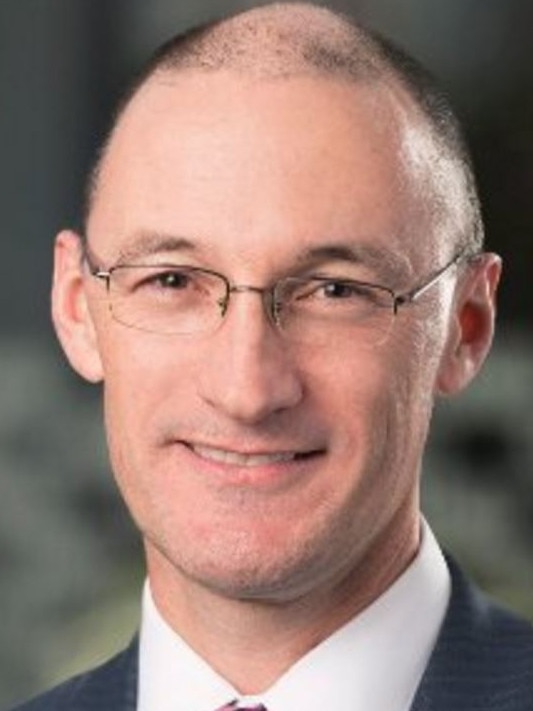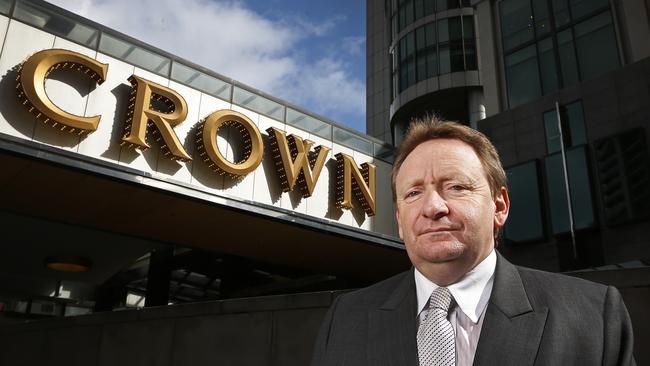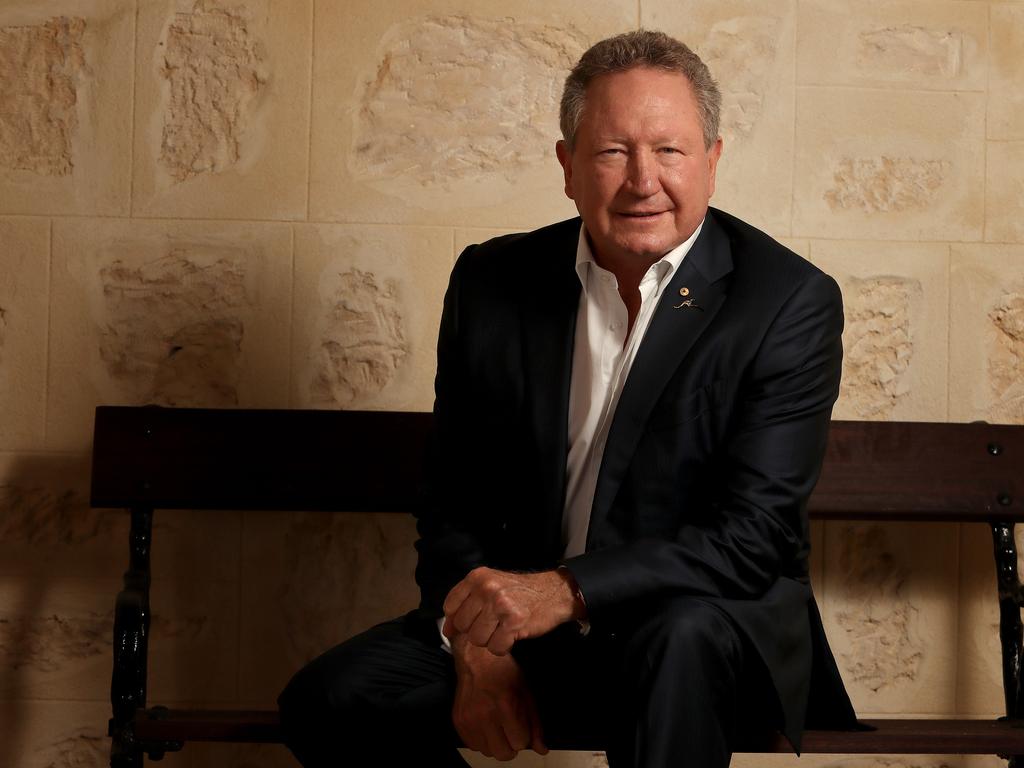Crown’s Chinese whispers grow louder
In his darkest moments, Jason O’Connor wondered whether he would see his wife Christina and teenage daughters Kasey and Chloe again.

They were only five words. But they said so much about the ordeal endured by Jason O’Connor during the harrowing 10 months he spent in a Shanghai prison three years ago.
“It’s all still too raw,” the former head of VIP operations for the James Packer-backed Crown Resorts said in September 2017 when approached by a reporter outside his home in Melbourne suburbia, a month after his deportation from China after being convicted of gambling crimes.
They are the only words the impeccably polite former accountant has uttered in public about his imprisonment, when in his darkest moments he wondered whether he would see his wife Christina and teenage daughters Kasey and Chloe again. His prayers were answered in July 2017, when they were granted a special access visit to the prison. A month later O’Connor was on a flight home.
Now, more than three years later, his appearance next week via video link at the NSW Independent Liquor and Gaming Authority’s inquiry into Crown will see him talk in detail publicly for the first time about the events surrounding his arrest en route to Shanghai’s Pudong International Airport in October 2016.

His detention, which made headlines around the world, was likened at the time to the case of Stern Hu, a Chinese-born Rio Tinto executive who served a nine-year sentence in a Shanghai prison after pleading guilty to stealing commercial secrets and receiving bribes. Hu, an Australian citizen who was the former head of Rio’s iron ore business in China, was arrested in 2009 along with some Chinese colleagues — amid increasing tension between China and Australia, between iron ore miners and Chinese steel companies.
Like O’Connor, Hu returned to Australia after being released from jail in Shanghai in July 2018.
But Hu has since disappeared from view, not wanting to discuss his jail time or trigger any fallout for his relatives still in China. Rio has also limited its discussion of the events.
O’Connor, who continues to work at Crown as an innovation and strategy manager, will not be so lucky when he answers questions under oath in the witness box next week.
Any discussion about his time in jail in China should receive worldwide attention at a time when China is under fire from governments around the globe on a range of fronts, from its trade policy to its actions in the South China sea and perceived influence overseas.
It also comes at time when questions are being raised by governments about the security of Westerners travelling to China, with the federal government this year upgrading its travel warning for the country.
O’Connor was one of 19 Crown staffers arrested in October 2016. Sixteen were sentenced to fixed jail terms of nine and ten months and fined different amounts.
Their arrests put an end to an aggressive strategy of Crown directly pursuing Chinese high rollers to come to its casinos in Melbourne and Perth to gamble.
Counsel assisting the ILGA inquiry Adam Bell has claimed that investigations of the circumstances of the China arrests have a bearing on whether Crown is a suitable entity to hold a licence to operate Sydney’s Barangaroo Casino, which opens later this year.
Testimony given this month has made countless references to internal Crown emails from O’Connor or where he was copied in, involving details of the operations in China as well as the casino giant’s discussions with immigration officials in Australian consulates in China.
Another central figure in those emails is the then Hong Kong-based Crown executive Michael Chen, a Harvard-educated Taiwanese-American who joined Crown Resorts as president of international marketing in February 2012 after working for seven years for the Caesars Entertainment Group.
Unlike O’Connor, Chen was not caught up in the raids on the Crown staffers in China in October 2016. Instead he was reportedly at home in Hong Kong.
When Crown’s China business shut down after the arrests, he left the company in April 2017.

His LinkedIn profile now reveals he is CEO of a Hong Kong-based firm known as Haku Capital Global Investment Advisers, which describes itself as “a multi-strategy fund manager and a commercial multi-family office serving the needs of ultra-high net worth families”.
He is also chairman of related entities HakuLife and HakuDevelopment, which have developed and manage a luxury seven-bedroom ski resort property at Niseko in the Japanese Alps. They are also in the process of developing associated villas in the town.
He is also chairman of a firm called Mascon, an American strategic supply chain co-ordination consultancy.
Chen describes himself in his profile as a “passionate leader, visionary, and driver of change. Fanatic about results. Deep experience developing high-end VIP customers, and strategic partners throughout Asia, especially China”.
They were traits were seemingly well and truly on display during his five years at Crown, according to emails tendered at the ILGA inquiry.
They lay bare Chen’s central role on the ground in Hong Kong and on the Chinese mainland as the mastermind of Crown’s China VIP strategy and its disastrous consequences.
After taking over as President in late 2012, Chinese leader Xi Jinping instituted a crackdown on corruption in the country which prompted many of its wealthy to opt for a much lower-profile lifestyle.
As the crackdown on corruption intensified, the inquiry was told, many former high roller gamblers were much more concerned about travelling to nearby Macau to gamble.
Around 2014, Crown saw an opportunity to use this new concern about Macau to reach out to potential high roller gamblers in China looking to travel further afield to its casinos in Melbourne and Perth, hiring people based in China.
By September 2014 it had staff members in seven different regions reporting to Chen.
Crown’s Australian Resorts chief Barry Felstead has told the inquiry that he had discussions over Crown’s business in China with O’Connor and Chen about once a week, with Chen calling in by telephone.
He said discussions in relation to the VIP international business at an operational level were decided by a group including Felstead, Chen, O’Connor and James Packer’s personal assistant, Ishan Ratnam.
Decisions in relation to the business of VIP international at an operational level were decided by a group comprising Felstead, Chen, O’Connor and Ratnam.
The inquiry heard that following a Chinese anti-corruption drive in 2014, Chen recommended Crown adopt a “double down” strategy for Chinese high-rollers, to promote Australia as a discrete alternative to Macau where wealthy gamblers could remain out of sight from Chinese government, and aggressively pursue high-value Chinese customers with offers of gambling loans.
But even at that time, there was also a concern not to fall foul of Chinese law.
In 2014 Chen sent an email to fellow Crown executives asking to ensure that all China funding templates not display “VIP funding” and any customer reference would be called services consulting fees. This was after a VIP customer’s bank account was queried.
On February 6, 2015 the Chinese government announced a major crackdown on casinos from overseas countries setting up representative offices in China to attract and recruit Chinese citizens.
The inquiry heard that while the situation in China was becoming more difficult for foreign casino operators, Chen was putting immense pressure on the China-based staff to step up their efforts to generate revenue from gamblers in the country.
In an email on VIP international officers from Chen on February 9, 2015, Chen told Crown’s VIP international staff: “Unfinished business — we need to keep pushing. No cap to our bonus plans.”
The inquiry also heard that Chen suggested Crown’s staffers working in China apply for work permits in Hong Kong or Singapore.
“We will be applying for Hong Kong/Singapore work permits for all of our China staff that does not currently hold a foreign passport,” he said in an email.
“This is purely a precautionary measure that will allow you to say that you work out of an overseas location and are on business travel to China.”
Hearing the evidence, the inquiry’s commissioner, former NSW Supreme Court judge Patricia Bergin, described it as “extraordinary suggestion”.
Giving evidence, Barry Felstead said it was “unusual” and “very odd”.
The inquiry also heard that in March 2015 Chen engaged a consulting firm named the Mintz Group to provide advice in relation to the corruption investigations in Macau and their potential effect on Crown. The firm included former intelligence agents, some of whom had worked for the CIA.
Mintz recommended that Crown staff in China act in a “low-key way” and avoid mobile phone and text messages.
On March 26, 2015 Chen sent an email to Barry Felstead saying he had received advice that the activities undertaken in China did not violate any criminal laws.
But he said it would be sensible to avoid putting the Crown staff in a situation where they were questioned, mentioning that a customer had recently been detained for three months without being formally charged.
“This is one thing that it’s important to understand when it comes to the China team. They are living in constant fear of getting tapped on the shoulder in a country where due process is inconsistently applied. It’s a risky place to be for all our team,” Chen wrote.
In another email dated May 8, 2015 to Felstead, O’Connor and Ishan Ratnam, Chen suggested that a group of Crown staff planning a proposed roadshow to China be split up to “minimise the number of folks in each meeting to be more under the radar”.
The situation in China for foreign casino operators worsened in June 2015, when some employees of the South Korean casino operators Paradise and Grand Korea Leisure were arrested in China.
The inquiry heard that there was an unofficial office being used by the Crown Resorts staff living in the southern Chinese city of Guangzhou, leased in the names of two Crown Resorts employees in Guangzhou who had their rental costs reimbursed by Crown.
The team in Guangzhou handled visa applications for all of the China regions until the arrests of October 2016.
Despite his stated concerns about the possible risks facing Crown staff in China, the inquiry shows a flow of emails from Chen encouraging VIP international officers to meet their sales targets in 2015 and 2016.
One copied to Felstead and O’Connor, dated April 28, 2016, read: “Those of you who are not yet at minimum acceptable, I remind everyone that all it takes is a couple of big customers to carry you into bonus land. You don’t keep trying you’ll never get those customers in. For those of you who are qualified to receive a bonus, remember that your plans are uncapped. The more you sell, the more you will make.”
Another sent on June 16, 2016 noted the VIP revenues for the financial year 2016 were coming in at just below target.
“It being essential that we exceed the target,” Chen wrote.
“Let’s also make a hard push on collections to make sure we don’t miss out on credit to count towards your bonuses for the 2016 financial year.”
He also sent emails to the sales staff encouraging them to make a push on collecting debts to ensure that they obtained their bonuses, asking them to make urgent calls to their top five debtors.
As the president international marketing, Chen also participated in long and short-term incentive plans of Crown based upon the revenue of VIP international.
In his evidence Barry Felstead agreed Chen was pushing the China-based VIP international staff hard to increase revenue.
“He was quite a pushy gentleman in relation to his targets,’’ Felstead said.
Whether Chen gets called before the inquiry remains to be seen but next week it will be O’Connor’s version of events — and his association with Chen — that will be in the spotlight for the first time.
So far commissioner Bergin has homed in on how much Crown executives, led by Felstead and former chief executive Rowen Craigie, knew of the dangers facing its staff in China.
It has revealed that few of the concerns shared by the executives about the tighter policies in China and the safety of the Crown employees were sent up the line to the Crown board.
Now Bergin is set to drill down to what was really happening on the ground in China during a manic period in Crown’s history.
Unlike Felstead and Craigie’s appearances in the witness box, O’Connor’s interrogation is set down for just a day. He will be hoping it goes no longer.
The 10 months between October 2016 and August 2017 are surely a chapter of his life he and his family are trying to forget.






To join the conversation, please log in. Don't have an account? Register
Join the conversation, you are commenting as Logout